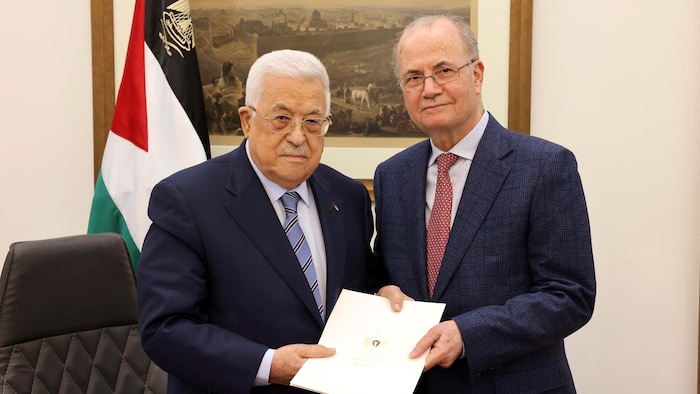Open in full screen mode Mohammad Mustafa (right), a close friend of Palestinian President Mahmoud Abbas (left), became prime minister of the Palestinian Authority in the West Bank on Thursday. Agence France-Presse Palestinian President Mahmoud Abbas has named one of his loyalists, economist Mohammad Mustafa, as new prime minister, as ;Weakened Palestinian Authority must place itself in the perspective of the post-war in Gaza. Mr. Mustafa, 69, was head of the Palestine Investment Fund (PIF). Former economic advisor to President Abbas, he held senior positions at the World Bank in Washington for 15 years. This international civil servant takes office in full war between Israel and the Palestinian Islamist movement Hamas in the Gaza Strip. At the end of February, former Prime Minister Mohammed Shtayyeh submitted the resignation of his government, arguing for the need for a new policy taking into account the new reality in the Gaza Strip and the urgent need for aid. an inter-Palestinian consensus. A few days later, the various Palestinian movements, including the rivals of Hamas and Fatah, the party of Mahmoud Abbas, met in Moscow and announced their intention to get talks back on track to unite their voices under the banner of the Palestine Liberation Organization (PLO). Consult the complete file View full file FollowFollow Since fratricidal clashes in June 2007, the Palestinian leadership has been divided between the Palestinian Authority of Mahmoud Abbas, which exercises limited power in the West Bank, territory occupied since 1967 by Israel, while Hamas is in power in the Strip. Gaza, now ravaged by war. In recent months, many Palestinians have criticized President Abbas, 88 years old and elected last time in 2005, for its helplessness in the face of Israeli raids in the Gaza Strip.
Middle East, the eternal conflict
Middle East, the eternal conflict
For some analysts, Mahmoud Abbas' appointment of Mohammad Mustafa constitutes a strategy to obtain greater American support for the Palestinian cause. (File photo)
The question of the role of the Palestinian Authority when the war ends remains a great unknown, due to its limited influence and the refusal of Israeli Prime Minister Benjamin Netanyahu to envisage a future Palestinian state.
For Palestinian analyst Abdul Majeed Sweilem, Mustafa's appointment represents an attempt to strengthen Palestinian institutions at a time when President Abbas is under siege and pressure from Israel and Washington.
Mr. Mustafa will likely be considered an acceptable profile for Americans, the analyst adds.
Proof of this is that the White House on Thursday welcomed the announcement of the appointment of Mr. Mustafa and called for the formation of a council of ministers as quickly as possible.
The United States will expect this new administration to implement credible and consistent policies and reforms. depth.
A quote from White House National Security Council spokesperson Adrienne Watson.
But for political scientist Khalil Shaheen, the new prime minister is above all a loyalist of President Abbas. Mustafa has an economic vision, but he remains under the authority of President Abbas. Ultimately, he will remain his right arm, he believes. Abbas wants to prove that he supports reforms, but with This appointment, he is ensuring he has a prime minister who will not challenge him, adds Mr. Shaheen.
The international community, led by the United States, supports the two-state solution as a perspective after the war and to establish peace in the region. But for Washington, this implies a renovated Palestinian authority, a senior White House official confided last month on condition of anonymity.
The war was provoked on October 7 by an unprecedented attack carried out in Israel by Hamas commandos infiltrated from Gaza, which resulted in the deaths of at least 1,160 people, mostly civilians, according to a count by the #x27;AFP made from official Israeli data.
In retaliation, Israel vowed to annihilate Hamas and launched a vast military offensive in the Gaza Strip which has left more than 31,300 dead, the vast majority civilians, since October 7, according to the latest report from the Hamas Ministry of Health.

